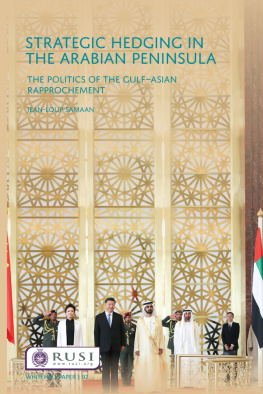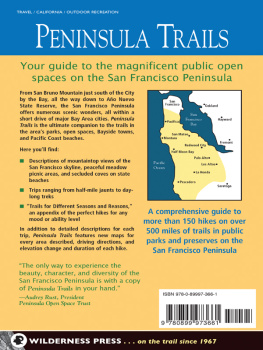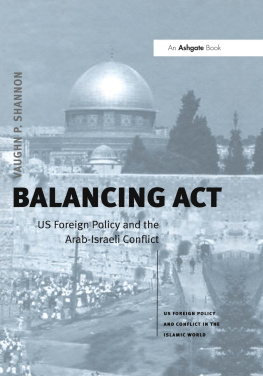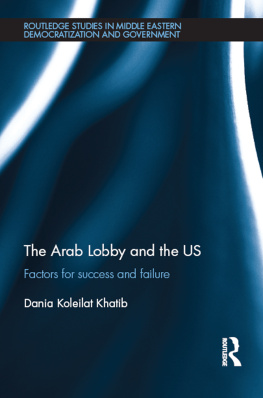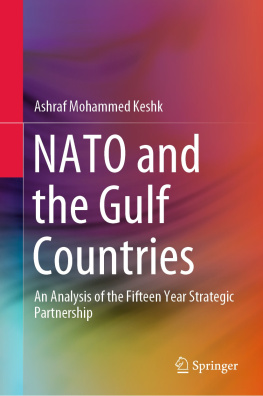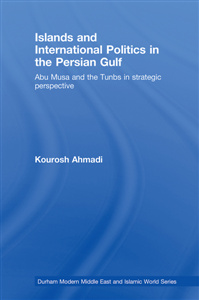Whitehall Paper 92
Strategic Hedging in the Arabian Peninsula: The Politics of the GulfAsian Rapprochement
Jean-Loup Samaan
www.rusi.org
Royal United Services Institute for Defence and Security Studies
Strategic Hedging in the Arabian Peninsula: The Politics of the GulfAsian Rapprochement
First published 2018
Whitehall Papers series
Series Editor: Professor Malcolm Chalmers
Editor: Emma De Angelis
RUSI is a Registered Charity (No. 210639)
ISBN [978-0-367-10973-8]
Published on behalf of the Royal United Services Institute for Defence and Security Studies
by
Routledge Journals, an imprint of Taylor & Francis, 4 Park Square, Milton Park, Abingdon OX14 4RN
Cover Image: Chinese President Xi Jinping and his wife meet with United Arab Emirates Vice President and Prime Minister Sheikh Mohammed bin Rashid Al-Maktoum in Abu Dhabi, July 2018. Courtesy of Xie Huanchi/PA Images
SUBSCRIPTIONS
Please send subscription order to:
USA/Canada: Taylor & Francis Inc., Journals Department, 325 Chestnut Street, 8th Floor, Philadelphia, PA 19106 USA
UK/Rest of World: Routledge Journals, T&F Customer Services, T&F Informa UK Ltd, Sheepen Place, Colchester, Essex, CO3 0LP UK
All rights reserved. No part of this publication may be reprinted or reproduced or utilised in any form or by any electronic, mechanical, or other means, now known or hereafter invented, including photocopying and recording, or in any information storage or retrieval system, without permission in writing from the publisher.
Jean-Loup Samaan is an associate professor in strategic studies for the United Arab Emirates (UAE) National Defense College. His research focuses on Middle Eastern strategic affairs, in particular the evolution of the Gulf security system, and the Israel-Hizbullah conflict. Prior to taking up his position in the UAE, he was a researcher for the Middle East Faculty at the NATO Defense College in Rome between 2011 and 2016. He was a policy adviser at the French Ministry of Defence from 2008 to 2011. Dr Samaan has authored four books and several articles for various international academic and policy journals such as the RUSI Journal, Survival, Orbis, Comparative Strategy, Politique Etrangre and Internationale Politik .
This Whitehall Paper examines the ongoing rapprochement between Gulf and Asian states, explaining how this current trend can be characterised as a case of strategic hedging. The initial idea behind this research came to me in spring 2012 when I flew for the first time to Abu Dhabi as a NATO official. It is only then, when confronted with the physical reality of the Asian presence in the Gulf, that I started investigating the topic and writing several publications. Later, the perplexity and bewilderment with which NATO decision-makers usually responded when I made the case for a better understanding of GulfAsian relations definitely convinced me that there was an urgent need for a strategic analysis of the topic.
Throughout the process of writing this paper, I have been fortunate to receive support and advice from many scholars and practitioners based in the Gulf, Asia, Europe and the US. Specifically, I would like to express my gratitude to Frederic Grare, Fatiha Dazi-Heni and Jonathan Fulton, who generously took the time to review earlier drafts of the manuscripts and provided precious comments that enabled me to clarify and strengthen my argument.
Finally, I am deeply grateful for the support of the Royal United Services Institute. Malcolm Chalmers and Emma De Angelis believed in the initial proposal and supported me to turn it into a Whitehall Paper. I thank the two anonymous reviewers for their helpful and constructive comments that greatly contributed to improving this final version.
Obviously, the shortcomings of this paper are my own. The views expressed here are strictly mine and do not reflect the views of the UAE National Defense College.
In 2017, commentators on Gulf politics focused most of their attention on the effects of US President Donald Trumps presidency on the region, while in fact diplomatic events in the peninsula were pointing in a different direction, demonstrating the growing strategic ties between Gulf and Asian countries.
First, Sheikh Mohammed bin Zayed Al-Nahyan, crown prince of Abu Dhabi, travelled to Delhi at the end of January, where he was invited as guest of honour to the celebration of Indias Republic Day, a privilege given in the recent past to the former US and French presidents, Barack Obama and Franois Hollande. The event was followed by the signing of a strategic global partnership between India and the UAE, including over a dozen bilateral agreements ranging from military cooperation to investment in Indian infrastructure. If economic deals were at the top of the agenda with, for instance, $25 billion in investments contemplated in Indonesia strategic considerations were also on the table, as Riyadh is eager to increase its counterterrorism cooperation with Muslim countries in Southeast Asia and to reinforce its Islamic Military Alliance (also known as the Islamic Military Counter Terrorism Coalition) formed on 15 December 2015.
Last, in June 2017, Saudi Arabia, alongside five other countries, The latter proposal ultimately failed, but the former enabled Qatar to counter, at least diplomatically, its sudden isolation.
These three episodes of Gulf politics may seem unrelated, but they in fact highlight one common development of regional politics: Gulf strategic partnerships are no longer exclusively looking to the US and Western, traditional powers; rather, they are moving increasingly towards other countries, particularly in Asia. This Whitehall Paper investigates this emerging trend and explains how Gulf countries have progressively been diversifying their strategic options, by hedging against the risk of a US retreat and building ties with Asian powers.
The New International Relations of the Gulf
For decades, if not centuries, the Arabian peninsula was a region of the world where the distribution of power was ultimately defined by Western countries successively Portugal, the UK and the US. As a result, Gulf monarchs were rarely depicted as strategic players that mattered. Given its geographic and demographic size and its central role in the Muslim countries, Saudi Arabia was recognised as the regional hegemon. But its diplomatic caution and limited capacities in the military field were trumped by the other regional powers that historically struggled for local hegemony: Iran and Iraq. As a matter of fact, US policy in the Gulf from President Jimmy Carter to the Iraq invasion of 2003 was to balance both Iranian and Iraqi ambitions through a posture of dual containment, a grand strategy later coined during the presidency of Bill Clinton, in which Saudi Arabia and its neighbours were the spectators rather than the actors of the competition.
Saudi Arabia and the small, newly established Arab monarchies (UAE, Qatar, Kuwait, Oman and Bahrain) built their own Gulf Cooperation Council (GCC) in 1981, which was to create a regional order, but the operational capacity of the GCC as a provider of stability remained limited. Furthermore, successive wars (the 198088 IranIraq War, the invasion of Kuwait in 1990 and the 2003 US-led invasion of Iraq) reinforced the view that Gulf states were to remain on the sideline of strategic decisions, leaving or outsourcing their national security to Western countries, in particular the US, the UK and France. This view of the Gulf prevailed among experts until 2011. However, this Western orientation of the Gulf security system is becoming less relevant today because of the growth of Gulf partnerships across the world, and in particular its pivot towards Asia.


